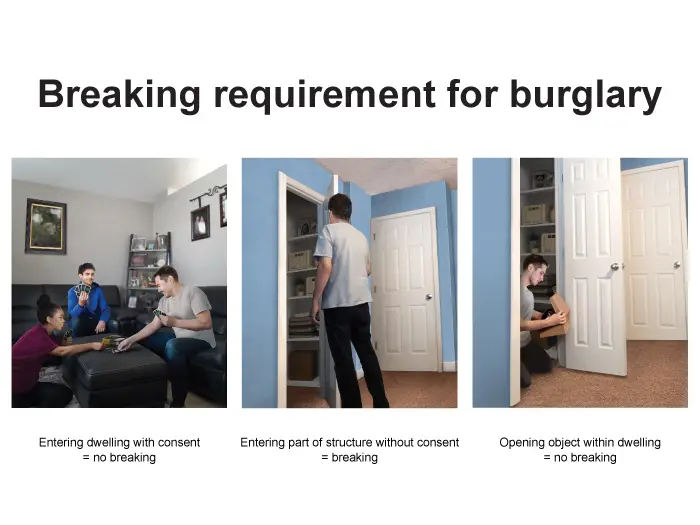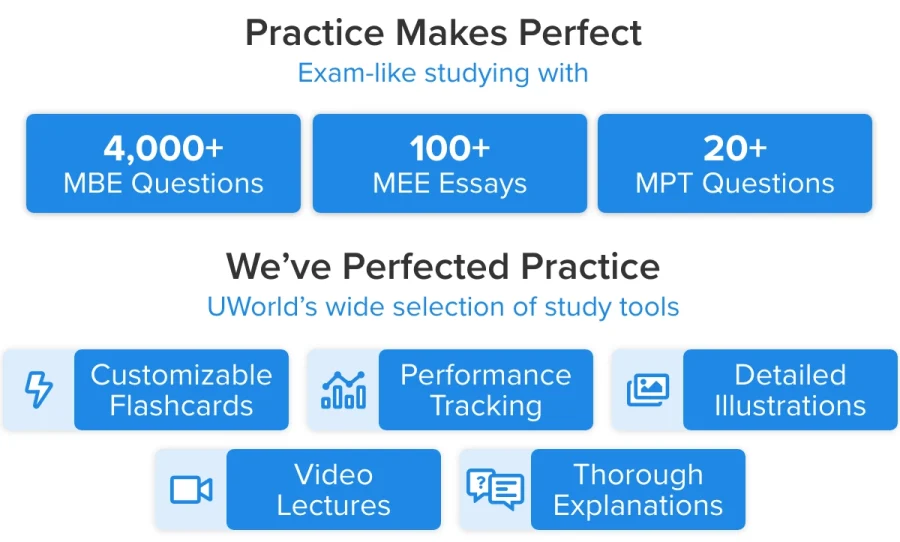The Colorado Bar Exam
The Colorado Bar Exam has been administering the Uniform Bar Exam (UBE®) since February 2012. The UBE consists of the Multistate Bar Examination (MBE®), Multistate Performance Test (MPT®), and Multistate Essay Examination (MEE®). The uniformity of the exam increases the ease of transferability across participating jurisdictions, which is great news for prospective lawyers who may want to move in the future. This article provides detailed information regarding CO bar exam results, dates, deadlines, locations, pass rates, and more.
Colorado Bar Exam Structure
The Uniform Bar Exam is administered over two days and consists of a writing section (MPT/MEE) and a multiple-choice section (MBE).
- Day 1 : MPT/MEE
- Day 2 : MBE
MPT
The MPT is weighted at 20% of the UBE and is administered on day one. Examinees are provided with faux case files imitating realistic scenarios and a folder with various legal documents, which they must use to respond to assignments.
MEE
The MEE is weighted at 30% of the UBE and is administered on day one. Examinees have 3 hours to answer six 30-minute essay questions.
MBE
The MBE is weighted at 50% of the UBE, making it the most heavily weighted section of the Colorado Bar Exam. Examinees will have two 3-hour sessions to answer a total of 200 multiple-choice questions.
Colorado Bar Exam Dates, Requirements, and Scheduling
Preparing your application for the Colorado Bar Exam and submitting it before the first deadline will save you $200. Applications open on September 1, 2023, and February 1, 2024, for the 2024 February and July exams, respectively.
Exam Dates
| Filing Deadlines | Timely Filing | Filing Fee | Late Filing | Late Filing Fee |
|---|---|---|---|---|
| February 27-28, 2024 | November 1, 2023 | $710 | December 1, 2023 | $910 |
| July 30-31, 2024 | April 1, 2024 | $710 | May 1, 2024 | $910 |
Requirements
The requirements to be admitted to practice law in Colorado vary depending on your circumstances—are you a recent law school graduate or an experienced attorney? Did you take the bar exam in another UBE state, or do you want to practice law in Colorado part-time or on a temporary basis? Your answer will determine the requirements you must meet to be admitted to the Colorado Bar.
Depending on your circumstances, the following options are available to become a fully-licensed attorney in Colorado:
- Taking the Colorado Bar Examination
- UBE Score Transfer
- Admission On-Motion
Regardless of the path you take, you must submit an application questionnaire and successfully go through a thorough Character and Fitness Investigation by the Office of Attorney Admissions. You must also have recently passed the Multistate Professional Responsibility Examination (MPRE®) with a scaled score of 85 and attended the Practicing With Professionalism Course.
To apply for the Colorado Bar Exam, you must file an application using the Colorado Supreme Court Office of Admissions’ most up-to-date CiviCore™ Application Management System (AMS) and forms by the applicable filing deadline.
Scheduling
Schedule your exam date after determining that you’re eligible to take the Colorado Bar Exam in the following way:
- File an online application using your unique NCBE number obtained from the NCBE website
- Complete the application
- Store a printed copy of your application
- Save any documents related to your application for future reference

Colorado Bar Exam Costs and Fees
The Colorado Bar Exam has an application filing fee of $710, which is non-refundable and must be submitted by the deadline. A $200 late fee will be assessed if you submit the fee after the first filing deadline but on or before the last filing deadline, and if you fail to submit the fee by the last filing deadline, your application will be denied. Late applications will only be accepted through December 1 for the February exam and May 1 for the July exam.
| Application Fees | |
|---|---|
| Timely Bar Exam Application Fee | |
| First Time | $710 |
| Repeat Taker | $710 |
| Re-application* | $400 |
| Late filing fee | $200 |
| Other Application Fees | |
| Admission to Motion | $1,800 |
| UBE Score Transfer | $810 |
Payment Policies
Colorado Bar Exam application fees must be paid electronically upon submission. Applications will be denied if payments are not received by the final filing deadline.
Cost-Saving Options
Between the exam application fees and bar prep costs, applying to the bar can get quite expensive. The good news is that scholarships and grants are available to help reduce the financial burden of pursuing a legal license.
Many Colorado area organizations, including universities and foundations, offer law students in the region various scholarships and grants to help with legal education and bar exam costs. For example, the University of Boulder Colorado Law offers a number of scholarships, fellowships, and awards annually on a competitive basis, including both academic and financial considerations. Colorado Law has curated a list of all scholarships funded by its community of alumni and friends, which you can access here.
We strongly encourage you to apply to as many of these scholarships as possible.
Colorado Bar Exam Subjects and Topics
The CO bar exam tests an examinee's ability to analyze and reason alongside their knowledge and understanding of fundamental legal principles. Furthermore, since Colorado has adopted the UBE, a successful exam score represents one's competency and readiness to practice law in the 40 other participating jurisdictions.
Multistate Essay Exam (MEE)
The MEE consists of six essay questions. Each question involves one or more of the subjects listed below. Some subjects may be paired together. Other subjects could be omitted. While it's impossible to know which subjects the NCBE® will choose for any given exam version, some have been tested more frequently than others historically.
For example, Civil Procedure has appeared on nearly every MEE in the past decade, while Criminal Law has only appeared several times. However, subjects that occur less frequently on their own may be paired with others.
- Business Associations
- Civil Procedure
- Conflict of Laws
- Constitutional Law
- Contracts
- Criminal Law and Procedure
- Evidence
- Family Law
- Real Property
- Secured Transactions
- Torts
- Trusts and Estates
Check out our MEE Subject Matter Outline for detailed explanations of MEE subjects and sub-topics.
Multistate Bar Exam (MBE)
The MBE tests the following subjects across 200 questions:
- Contracts
- Constitutional Law
- Criminal Law and Procedure
- Civil Procedure
- Evidence
- Real Property
- Torts
You may find a complete list of subjects and subtopics here: MBE Subject Matter Outline
Multistate Performance Test (MPT)
The Colorado Bar Exam includes two 90-minute performance legal case scenarios challenging applicants to think like a lawyer by determining the correct course of action an attorney should take in response to the case. Both questions will provide detailed instructions, factual data, statutes, and other references to assess your legal analysis competencies.

Colorado Bar Exam Scoring/Grading
To be admitted to the Colorado Bar, applicants must pass the UBE with a minimum scaled score of 270 out of 400. Exam weightage is divided between the three sections as follows:
The MEE and MPT are combined into half the weightage of the test and graded as such. Therefore, the writing section (MEE/MPT) and the multiple-choice section (MBE) each comprise 50%, or 200 points, of your total scaled score. If you do poorly on one section of the exam, you can make up for it on the other, as long as these scores combine to a sum of 270 or more.
Note that getting 134 of 200 MPT questions correct does not necessarily mean you've earned 134 scaled points. Scaled scoring is employed to ensure fairness across exam versions. This scoring model is true for all three sections of the bar exam.
For example, July's exam may be more difficult than February's. It would be unfair to allow someone to pass or fail based on the relative difficulty of their exam version. Therefore, examinees' raw scores are transformed into scaled scores through a statistical method called equating. Unfortunately, the NCBE does not release data on the calculations it uses to determine scaled scores.
Colorado MPRE Minimum Passing Score
Before you can practice law in Colorado, you must also pass the Multistate Professional Responsibility Examination, which you must take before submitting your bar application. All Colorado bar applicants must earn a scaled score of 85 to be admitted to the Colorado Bar.
Colorado Bar Exam Pass Rates
As is typical with bar exams across the country, the Colorado Bar Exam's repeater pass rate is markedly lower than the first-timer pass rate. This phenomenon is likely because many students who failed the first time haven't changed their study habits significantly.
| Exam | Overall Pass Rate | First-Timer Pass Rate | Repeater Pass Rate | Results Release Date |
|---|---|---|---|---|
| July 2023 | 74% | 80% | 35% | September 28, 2023 |
| Feb 2023 | 47% | 54% | 42% | April 27, 2023 |
Below are the annual pass rates for the Colorado Bar Exam since 2016, divided into first-time examinees and repeaters:
| Exam | First Timers | Repeaters | Overall | |||
|---|---|---|---|---|---|---|
| Year | No Of Candidates |
Pass Rate |
No Of Candidates |
Pass Rate |
No Of Candidates |
Pass Rate |
| 2022 | 766 | 73% | 194 | 30% | 960 | 65% |
| 2021 | 865 | 76% | 189 | 30% | 1,054 | 67% |
| 2020 | 731 | 79% | 178 | 39% | 909 | 71% |
| 2019 | 811 | 77% | 219 | 39% | 1,030 | 69% |
| 2018 | 859 | 73% | 222 | 32% | 1,081 | 64% |
| 2017 | 879 | 75% | 224 | 46% | 1,103 | 69% |
| 2016 | 958 | 76% | 213 | 39% | 1,171 | 69% |
Colorado Bar Exam Results
Colorado Bar Exam results are typically released approximately 2-3 months following the exam. The July 2023 exam results were released on September 28, 2023, and on April 27, 2023, for the February 2023 exam.
Colorado Bar Exam Reciprocity
Admission by MBE Score Transfer
- they have been engaged in the active practice of law for three of the five years preceding their application, and
- meet all admission requirements
Admission by UBE Score Transfer
Applicants who have earned a scaled score of 270 or higher on a UBE in another jurisdiction within the preceding three years may use that score to apply for admission to the Colorado Bar.
What Makes the Colorado Bar Exam Unique?
Colorado is one of a few jurisdictions that permit the temporary practice of law through limited licenses and certifications issued by the Office of Attorney Registration. These include:
- Single Client
- Pro Hac Vice
- Foreign Legal Consultant
- Judge Advocate (JAG)
- Military Spouse Certification
- Law Professor Certification
- Practice Pending Admission
- Law Student Practice
- Pro Bono Certification
To be eligible to practice under a limited license or certification, you must meet certain requirements in addition to submitting an abridged application, but you are not required to take the MPRE for temporary law practice.
Colorado Bar Exam for Foreigners
Foreigners seeking to sit for the Colorado Bar Exam must have graduated from a foreign law school that is accredited within its jurisdiction, is based on English common law, and is equivalent in duration to JD programs accredited by the American Bar Association (ABA).
In addition, applicants must have either:
- Completed an LL.M degree commensurate with ABA-accreditation standards at a US law school; or
- Be authorized to practice law in a jurisdiction(s) outside of Colorado (foreign or domestic) and is in good standing in said jurisdiction(s).
Foreign attorneys and law school graduates who are ineligible for application on motion as qualified out-of-state attorneys may be eligible to sit for the Colorado Bar Exam provided they meet all of the requirements set forth by the Colorado Supreme Court Office of Admissions. You must submit a Petition for determination of Eligibility to sit for the Colorado Bar Exam pursuant and include a check for $100, which will be credited to your application fee if you are determined eligible to sit for the exam but not refunded if you are determined not to be eligible.
Final Takeaways
The Themis + UWorld full bar review bundle offers 4000+ MBE practice questions, including recent National Conference of Bar Examiners (NCBE®) licensed questions. Each question has been carefully crafted by our in-house team of legal professionals or is licensed by the NCBE.
Access 100+ MEE practice essays and dozens of MPT practice questions from past bar exams. In addition, our platform offers customizable flashcards, performance tracking, answer explanations filled with vivid illustrations and charts, readings paired with easily digestible 10-15 video lectures, and thorough explanations for every answer choice.

Contact Details of Colorado State Bar
The Colorado Supreme Court answers calls Monday through Friday from 8:30 am to 5:00 pm, except for state and federal holidays. Contact information is tabulated below:
| Colorado Board of Bar Examiners Contact Information | |
|---|---|
| Medium | Info |
| Phone Number | 303-928-7770 |
| Fax Number | 303-501-1147 |
| [email protected] | |
| Address | Ralph L. Carr Judicial Center Colorado Supreme Court Office of Attorney Admissions 1300 Broadway, Suite 520 Denver, CO 80203 |

Colorado Bar Exam FAQs
How long is the Colorado bar exam?
Can Anyone Take the Bar Exam in Colorado?
How many times can you take the Colorado bar exam?
Colorado does not have a set limit on the number of times you can take the Colorado Bar Exam, so if you fail the exam on your first attempt, you can go back to the drawing board to come up with a better game plan to perform better the next time.